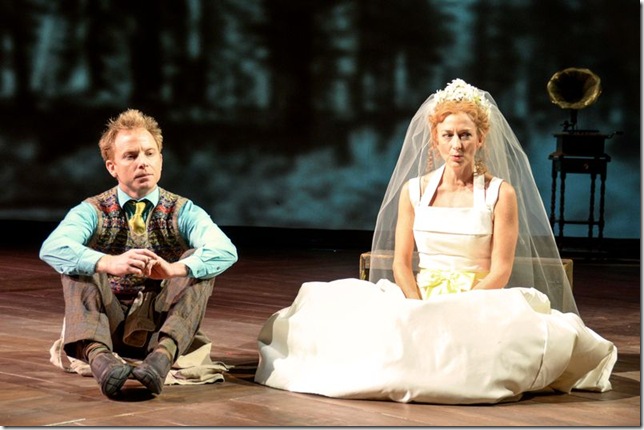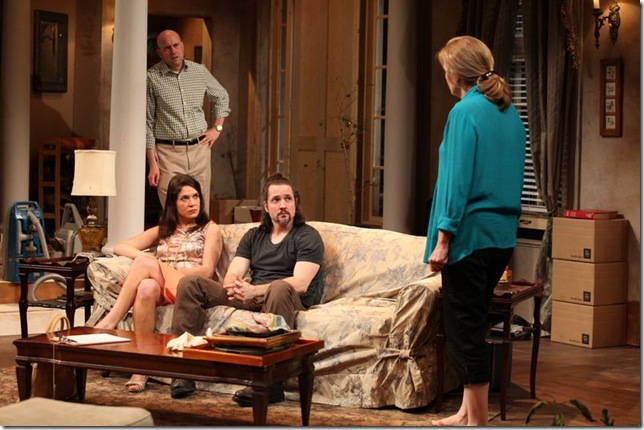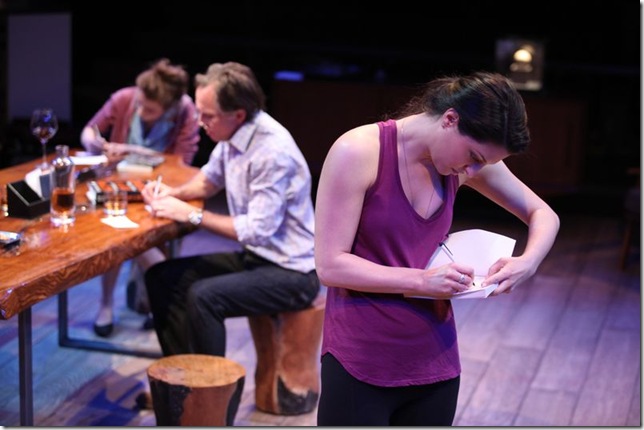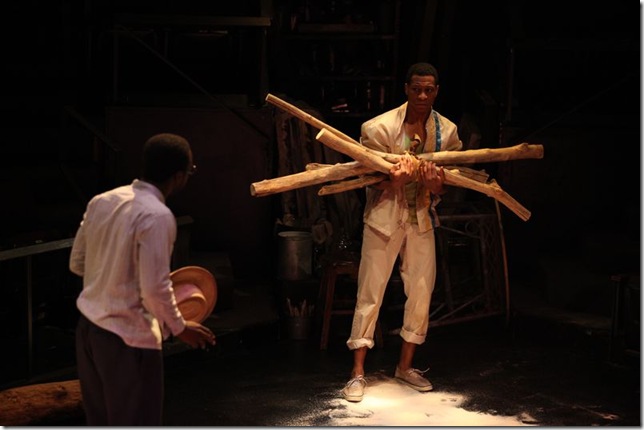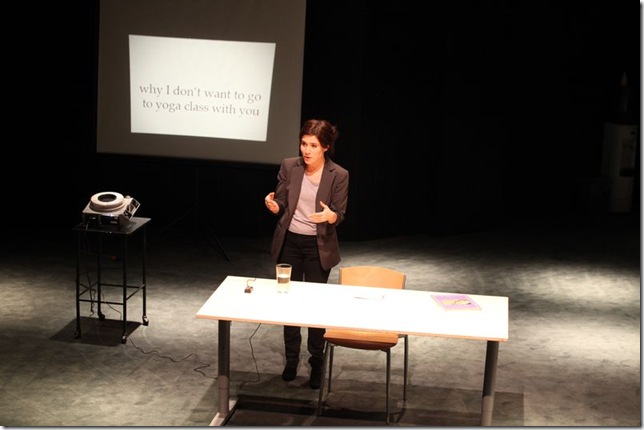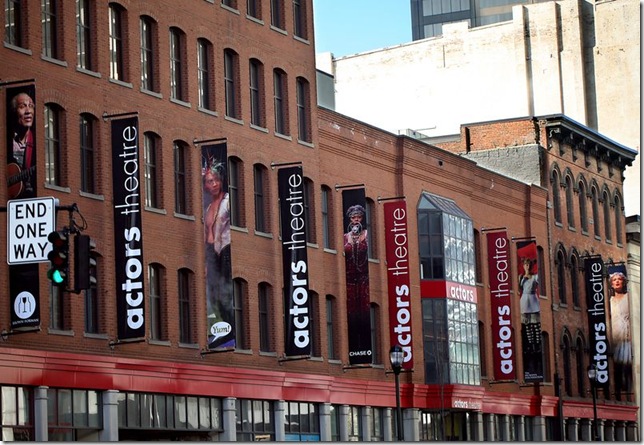LOUISVILLE, Ky. ― Since 1976 ― 37 years, said to be the longest continuous corporate underwriting of the arts ― the Humana Foundation has been funding an annual festival of new American plays at Actors Theatre of Louisville.
That means hundreds of world premieres, many of which have subsequent lives in New York ― The Gin Game, Agnes of God, Dinner with Friends, etc. ― or at resident stage companies around the country ― like Keely and Du, Patient A, God’s Man in Texas and 2, to name just a few that Florida Stage produced over the years.
And new play development being the crapshoot that it is, there have also been scores of scripts at the Humana Festival of New American Plays that were never seen again anywhere after their initial exposure in Louisville.
The festival was the brainchild of founding ATL artistic director Jon Jory, and the national media that descended on Louisville last weekend to see five full-length plays and six short scripts in a dizzying repertory array were looking for clues to the taste of the newest artistic honcho, Les Waters.
While the scripts were all over the map in subject matter and artistic quality, there was one clear standout. It was Will Eno’s amusing and ultimately quite affecting take on Henrik Ibsen’s epic classic, Peer Gynt, here known simply by the title Gnit, and, no, that is not a typo. Waters, invoking the prerogatives of his office, chose Gnit to direct himself, and gave it a stunning, physically elaborate production that is unlikely to be bettered, no matter how many subsequent mountings the play receives.
Eno, a writer of impressive verbal dexterity, is probably best known for Thom Pain (based on nothing), a much smaller, but similarly nimble work, which also tends to divide audiences. Put me squarely in the pro-Gnit camp, for its surprising fidelity to Ibsen ― albeit frequently tongue-in-cheek ― and its ability to shift emotional gears, seemingly at will.
Peter Gnit is an obsessively self-involved young man, a disappointment to his widowed mother. After impulsively kidnapping a bride on her wedding day, then falling in love with someone else, Gnit embarks on a global journey in search of personal discovery, a picaresque, Candide-like trek that takes him to Morocco, Egypt and points beyond before he finds himself back home.
Besides showcasing new work, it is worth remembering that the company is called Actors Theatre, and for this month-long festival, it imports some impressive talent from around the country to populate these plays. Chicago actor Dan Waller is delightfully deadpan as Gnit and Danny Wolohan is a real find as Town, a one-man community of voices.
* * *
You cannot attend a new play festival for long without encountering a dysfunctional family script, and the best of them this year is certainly Branden Jacobs-Jenkins’ Appropriate. It concerns an Arkansas clan that descends upon the family’s dilapidated plantation when the patriarch dies, a reunion that unleashes their greed, venom and secrets.
It is part of a theatrical genre with a rich tradition and Jacobs-Jenkins’ most imposing obstacle would seem to be comparisons to Pulitzer Prize-winner August: Osage County. Still, his dialogue is crisp, his characters are vivid and chances are you will recognize a few folks from your own family. I could have done without the redundant epilogue, but Appropriate is already scheduled for productions next season at Chicago’s Victory Gardens Theater and D.C.’s Woolly Mammoth.
* * *
Far more compact, but also packed with dramatic confrontation, is The Delling Shore, by Sam Marks, a four-character piece set in the upscale, if remote summer home of a celebrated novelist and his grown daughter. They are visited by a former friend of the author, also a writer but one who has yet to achieve success, along with his own daughter.
Tensions surface of course, based on past slights and grudges. The visitor needs favors ― a blurb for his unpublished book, an internship for his daughter ― but he refuses to grovel for them. Eventually, it comes down to a wager on a literary bluffing game which threatens to monopolize the play and a perceived act of potential violence that was unconvincing as played.
Nevertheless, Marks shows he can write and could emerge as a voice to be reckoned with, even if The Delling Shore ultimately fades away.
* * *
The newest writer in the festival is Jeff Augustin, currently an MFA playwriting candidate at the University of California, whose compelling, lyrical Cry Old Kingdom capably mixes the political and the personal in the 1964 Haiti dominated by Papa Doc Duvalier.
Revolution is brewing, reflected on the faces of three characters ― Edwin, a painter trying to avoid the imminent conflict, his wife Judith, who must deal with the practical realities by default, and a peasant named Henri, desperate to escape the island in a crude boat he builds in front of our eyes. The play is brief and feels like it needs further fleshing out, but could be an early draft of a work that could make a poetic impact.
* * *
Perhaps an interest in yoga or Eastern spiritualism would have helped, but my least favorite full-length play of the festival was O Guru Guru Guru, or why I don’t want to go to yoga class with you by Mallery Avidon. Running only 90 minutes, but feeling much longer, the work is divided into three parts. First is a talk, complete with note cards, by a young woman named Lila (endearingly performed by Rebecca Hart) who explains her reticence to embrace the trendy quasi-religious exercise regimen.
After her, however, audience volunteers are invited onstage to participate in an extended yoga meditation and chanting ritual, by a diverting shadow puppet show that illustrated the birth of the elephant god Ganesh. The third segment takes place on the set of the film Eat, Pray, Love, where Lila encounters Julia Roberts (Khrystyne Haje, an uncanny double), who imparts some life lessons.
Even if one were drawn to such spiritual searches, O Guru Guru Guru would feel dramatically inert and impoverished.
* * *
This year’s Humana Festival focused more on emerging writers than established names, though the much acclaimed Sarah Ruhl (Dead Man’s Cell Phone, The Vibrator Play, The Clean House) chipped in a 10-minute script called Two Conversations Overheard on Airplanes, which is both the title and an accurate description. And it is as prosaic as most idle chats with strangers one will never meet again.
A more involving vignette was Emily Schwed’s Halfway, about a sister’s visit to her recovering sibling (again the impressive Rebecca Hart) in a halfway house. This brief dramatic gem could well resurface at City Theatre’s Summer Shorts, which has a frequent exchange program with Actors Theatre.
* * *
Finally, in the Humana Festival’s rich tradition of theatrical gimmicks, attendees traveled 10 blocks away from ATL’s complex to a ― get this ― public elementary school of the arts to watch a program of three one-act plays performed by the Acting Apprentice Company. The plays were commissioned by ATL for this showcase and were required to involve stage flying (with aerial choreography by ZFX Flying Effects) and to be about sleep and dreams.
Perhaps the plays hidden agenda was to make the others in the festival look good by comparison, but this flying triptych, collectively known as Sleep Rock Thy Brain, was as soporific as an Ambien.
